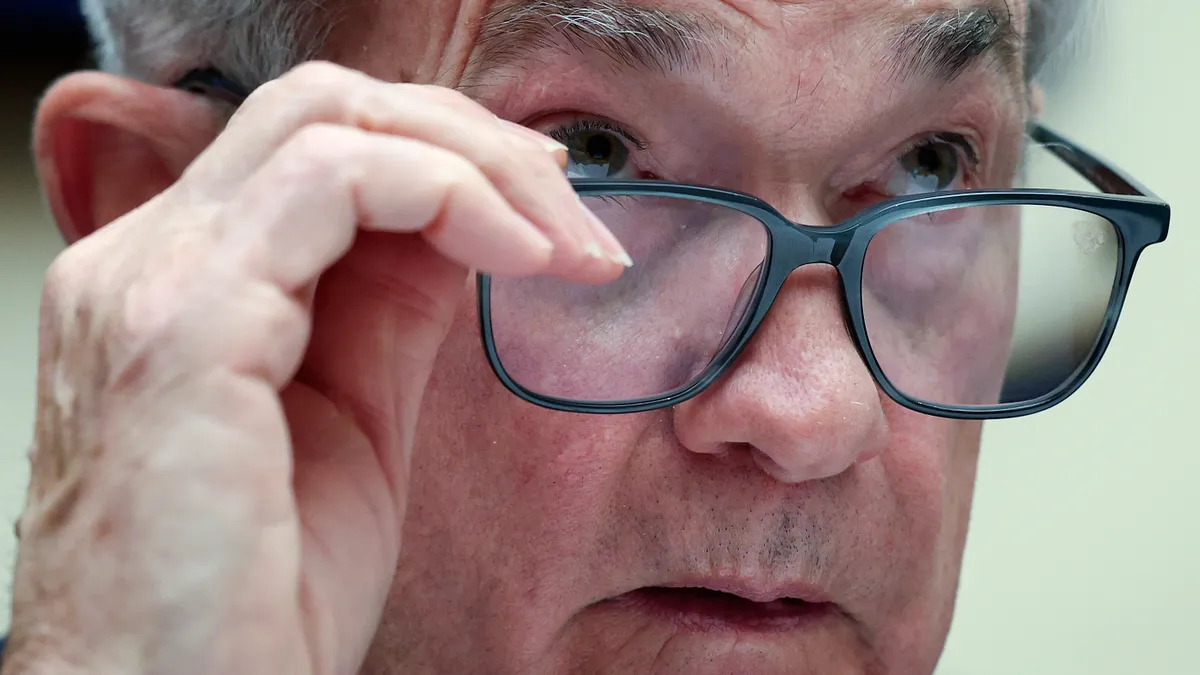Dive Brief:
- The surprising rise in inflation this year will likely compel the Federal Reserve to hold interest rates at a 23-year high longer than expected, Fed Chair Jerome Powell said Tuesday, adding that the odds of another rate increase are “very small.”
- “I don’t think that it’s likely, based on the data that we have, that the next move we make would be a rate hike,” Powell said. “It’s more likely that we’ll be at a place where we hold the [monetary] policy rate where it is.”
- “By many, many measures the policy rate is restrictive” at the current range between 5.25% and 5.5%, he said. “It’s really a question of keeping policy at the current rate for a longer time than had been thought.”
Dive Insight:
Fed officials in March forecast in a median projection that the central bank this year would trim the main rate in three, quarter-point increments.
Since then, data has revealed a persistent inflationary trend in prices paid by both consumers and producers. The Fed’s preferred inflation gauge — the core personal consumption expenditures price index excluding food and energy — rose 3.7% last quarter on an annualized basis, well above the central bank’s 2% target.
Policymakers on May 1 left the federal funds rate unchanged, noting little recent progress in their two-year fight to beat back inflation. They said that they need greater confidence that inflation is falling at a sustainable pace before beginning to trim borrowing costs.
“We have the highest interest rates in some time,” Powell said Tuesday. “I think it may be that it takes longer than expected to do its work and bring down inflation,” he said, referring to tight monetary policy.
“The question is, ‘is it sufficiently restrictive?’ and I think that’s going to be a question that time will have to tell,” he said.
Referring to the odds of another rate hike, Powell said, “that could be a very small probability.” At the same time, he said he is less confident than earlier this year in the pace at which the Fed will slow inflation to 2%.
CEOs and consumers have also expressed less optimism in a quick reversal in price pressures.
CEOs expect 3.8% inflation during the coming year compared with 3.4% three months ago, the Cleveland Fed said Monday in a report on its quarterly survey of chief executives. They trimmed their inflation forecasts during the previous five surveys.
For their part, consumers anticipate 3.3% inflation during the next 12 months — compared with 3% in March — and the highest rate in five months, the New York Fed said Monday, describing results from its Survey of Consumer Expectations. Over a five-year horizon, inflation expectations rose to a 2.8% annual rate from 2.6%.
A University of Michigan survey early this month also revealed rising pessimism among consumers about price pressures. They expect 3.5% inflation in the coming 12 months compared with the 3.2% rate they forecast last month, university researchers said Friday.
Inflation expectations can snowball, so they loom large when Fed officials mull a change to monetary policy.
Referring to the surge in food prices in recent years, Powell said, “people are unhappy and I fully appreciate that.”
“You tell people inflation is coming down and they think, ‘I don’t understand that — the price of all the things that I buy hasn’t come down,’” Powell said. “They’re suffering.”















